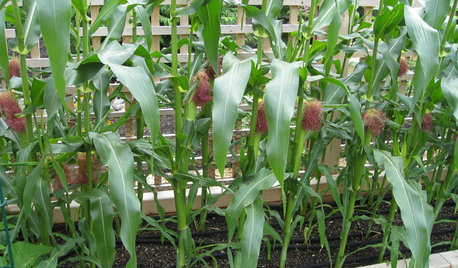Stop Genetically Modified Crops
mamamia
17 years ago
Related Stories

SUMMER FRUITS AND VEGETABLESHow to Grow Your Own Fresh, Sweet Corn
Here's how to plant and care for your own mini cornfield
Full Story
EDIBLE GARDENSHow to Grow Your Own Sweet Summer Crops
This guide will help any gardener get started on growing the freshest warm-season veggies and berries for summer
Full Story
EDIBLE GARDENSSummer Crops: How to Grow Tomatoes
Plant tomato seedlings in spring for one of the best tastes of summer, fresh from your backyard
Full Story
GARDENING GUIDESHow to Stop Worrying and Start Loving Clay Soil
Clay has many more benefits than you might imagine
Full Story
GARDENING FOR BUTTERFLIESGardening for the Bees, and Why It’s a Good Thing
When you discover how hard bees work for our food supply, you may never garden without them in mind again
Full Story
EARTH DAYHow to Design a Garden for Native Bees
Create a garden that not only looks beautiful but also nurtures native bees — and helps other wildlife in the process
Full Story
LIFE10 Things Night Owls Know to Be True
Love being up while the world slumbers? Prefer a really late bedtime to an early night? These observations on night owl life may ring true
Full Story
FRONT YARD IDEASBefore and After: Front Lawn to Prairie Garden
How they did it: Homeowners create a plan, stick to it and keep the neighbors (and wildlife) in mind
Full Story
GARDENING GUIDESEssential Watering Tips for Your Edible Garden
To give your edible plants just what they need, check out these guidelines for how, when and how much to water
Full Story
EDIBLE GARDENS8 Last-Minute Additions to a Summer Edible Garden
It’s not too late to get these vegetables and herbs planted for a bountiful harvest this year
Full StorySponsored
Custom Craftsmanship & Construction Solutions in Franklin County






louie_gardner
snc299
Related Professionals
Ashburn Landscape Architects & Landscape Designers · Horsham Landscape Architects & Landscape Designers · Sand Springs Landscape Architects & Landscape Designers · Canton Landscape Contractors · Alamo Landscape Contractors · Davidson Landscape Contractors · Gloucester Landscape Contractors · Oak Forest Landscape Contractors · Paramus Landscape Contractors · Pleasant Grove Landscape Contractors · Pleasanton Landscape Contractors · Rancho Santa Margarita Landscape Contractors · River Ridge Landscape Contractors · Severna Park Landscape Contractors · Wheat Ridge Landscape Contractorslouie_gardner
mamamiaOriginal Author
bandit_tx
mamamiaOriginal Author
bandit_tx
Konrad___far_north
bandit_tx
nippersdad
bandit_tx
nippersdad
bandit_tx
alliglass
ccrb1
sandy0225
Konrad___far_north
weirdtrev
vaherbmom
Konrad___far_north
aperegina
torajima
brendan_of_bonsai
torajima
brendan_of_bonsai
torajima
brendan_of_bonsai
sam_md
brendan_of_bonsai
rocketship5555_hotmail_com
speedfreakian
Konrad___far_north
Konrad___far_north
anneface
Charlie
MartinGulasis
julysun
JRG13